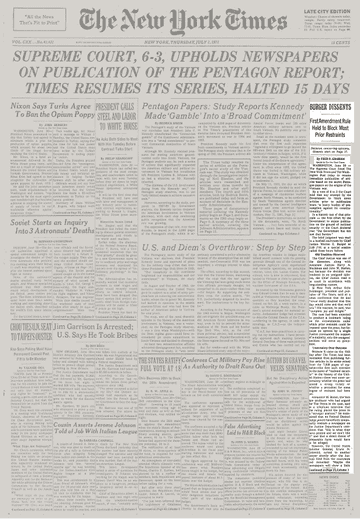
Photo by The New York Times
Landmark Ruling Lifted Gag Order on Ex-Banker, Accused of Embezzlement, Who Engaged in Letter-Writing Campaign to Save His Good Name This is an overdue report on a late 2019 development, in which Steve Harvey Law achieved a notable free speech victory in the U.S. Court of Appeals for the Third Circuit. In Bank of Hope v. Chon, 938 F.3d 389 (3d Cir. 2019), the court struck down a trial court order prohibiting a civil defendant from speaking to public shareholders of a bank that had sued him on the grounds that it amounted to an unconstitutional prior restraint in violation of the First Amendment. Our firm represented former banking executive James Ryu who was sued in 2014 by Bank of Hope, which claimed that Ryu had engaged in a $1.5 million embezzlement scheme. Ryu denied that he had played any role in the embezzlement scheme. He criticized the bank for relying on a single witness against him who admitted to stealing the entire $1.5 million herself. He contended that her testimony was uncorroborated, inconsistent, and inherently unreliable. In the spring of 2017, frustrated with the pace of the litigation in which he sought to clear himself of the charges, and without the participation of counsel, Ryu embarked on a letter-writing campaign to the bank’s board of directors and to the largest owners of the shares in the bank’s parent corporation, investment firms and pension funds. The letters accused the bank of bringing a claim against him that it knew or should have known was baseless and that ruined his life and harmed his family too. He argued that the bank’s claim against him amounted to gross mismanagement and dereliction of duty by the bank’s senior management. He demanded that the bank drop its claims and compensate him for the harm caused by its lawsuit against him. The letters got the bank’s attention, but rather than withdrawing the claim, the bank convinced the trial court to issue an order forbidding them. The trial court order prohibited communications with the bank’s employees and agents, including its board of directors, as well as third-party shareholders. On appeal, we narrowed the First Amendment claim by taking no issue with the trial court’s order except as applied to the third-party shareholders. We conceded the trial court’s authority to regulate communications between the parties. We argued that the trial court’s order prohibiting Ryu’s communications with third-party public shareholders amounted to a prior restraint on speech in violation of the First Amendment. The classic example of such restraint is found in the well-known Pentagon Papers case, except instead of a court order against The New York Times and The Washington Post commanding the papers not to publish leaked government documents, here it was a court order against Ryu to not publish his letters to the bank’s public shareholders. In issuing the gag order, the trial court had accepted the bank’s argument that Ryu’s speech amounted to mere “commercial speech,” like advertising, which the government can regulate. We argued that the trial court clearly erred in its expansion of the commercial speech doctrine outside of the traditional area of sales of goods and services. We also argued that Ryu’s motive to be compensated for the harm the bank caused to him did not transform his speech into something less deserving of First Amendment protection. Yes, we argued that he wanted to be paid for the harm he suffered, but his was really a cry for justice. This was not the usual grounds for a gag order, which is to prevent pretrial publicity that could affect the jury pool. Here, the trial court had issued an order to protect the bank from having its shareholders receive communications about it, for fear that bad publicity could affect its decision about the case including possibly dropping the claims against Ryu or settling his claim against it. The Third Circuit agreed with our position. It held that the trial court’s order amounted to an unconstitutional prior restraint. It acknowledged our argument that the commercial speech doctrine did not apply and explained why Ryu’s speech could not be regulated even assuming it qualified as commercial speech, noting that a trial court has power to regulate the communications of litigants to protect the judicial process, but that in order to restrict speech there must be clear evidence of some harm that could happen, and then the judicial remedy must be narrowly tailored to address and prevent that harm. No such steps analysis was performed in this case, and so the Third Circuit found that the trial court’s ruling was incorrect, and it vacated the trial court’s gag order. This decision is important because it recognizes that a party in litigation has a First Amendment right to speak out about the case. Courts cannot regulate speech by litigants about a case just because the speech offends another party to the case or even if it offends the court. The right to speech is most important when the speech is unpopular and the speaker is powerless. In the case of a person accused of a crime, whether it be by the government or, as here, by a powerful bank, the right to publicly proclaim their innocence and decry the injustice they face is fundamental.

